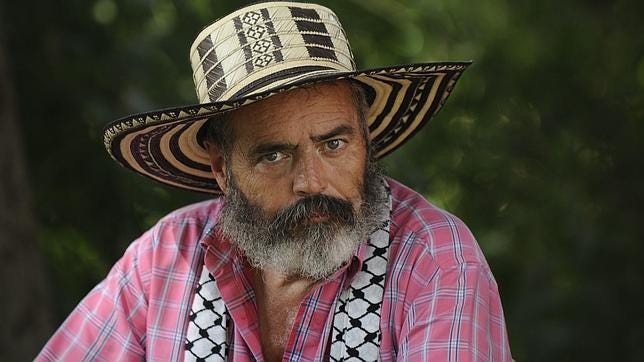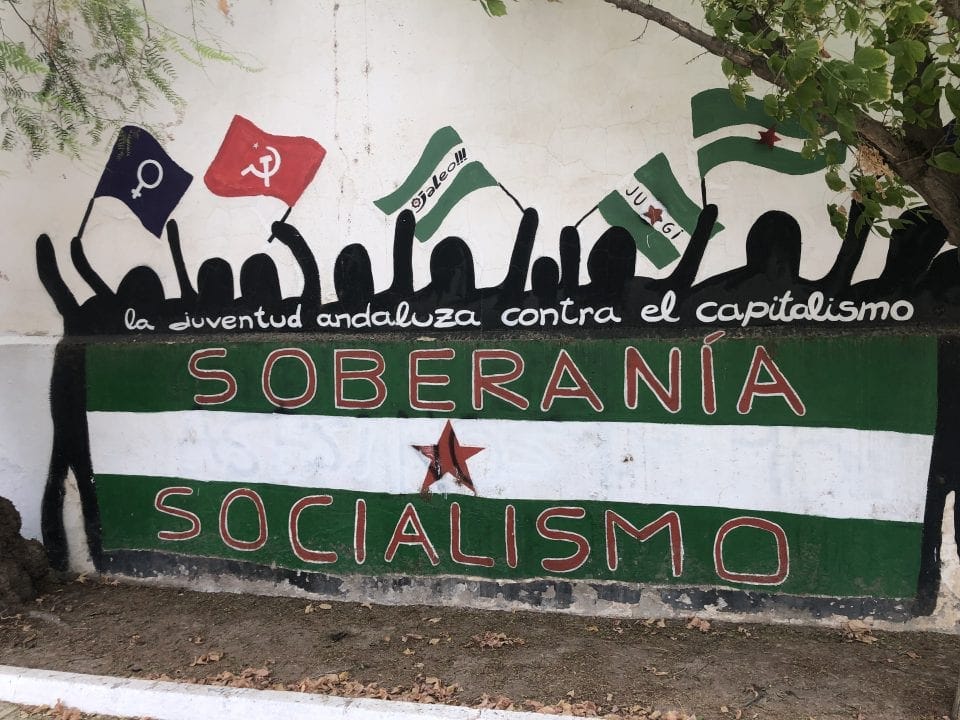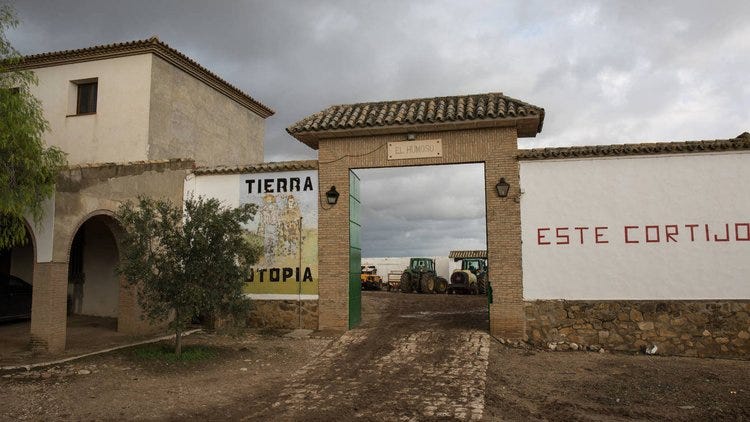Marinaleda: A Communist Utopia in Andalusia
In Spain's deep south, one small village has decided to do things differently, and has been practicing rural communism for the last 40 years.
Among the olive groves in the heart of Andalusia lies a remote village of revolutionary farm labourers. Under the leadership of charismatic mayor Juan Manuel Sánchez Gordillo, Marinaleda has for decades forged a path contrary to the rest of Spain - one that emphasises the collective good over private interests, and jobs over profit. In this self-professed ‘communist utopia’, unemployment barely exists, the means of production is owned by everyone through a cooperative and housing is treated as a public good rather than a private investment. The wall of the town hall sports a mural of Che Guevara.
Marinaleda sits in the far east of Sevilla province, where the main industry is agriculture. The local workers co-operative runs the vast El Humoso farm which surrounds Marinaleda. Following a philosophy of creating jobs over chasing efficiency, the co-operative selects labour intensive crops to farm - broccoli, peppers, artichokes, beans and olives. While elsewhere in Spain farm owners pay illegal wages to the unofficial immigrants who pick their crops, in Marinaleda the cooperative pays its members more than double the minimum wage. If the locals don’t work in the fields, they work in the food processing plant or the oil press, which sends delicious olive oil across Spain and the world.
The mayor, Gordillo, is an old fashioned communist; a proponent of hard work and struggle in service of the greater good. His political beliefs, he claims, are drawn from Jesus Christ, Che Guevara, Marx, Lenin and Ghandi. In a 1985 interview he told El País, “We have learned that it is not enough to define utopia, nor is it enough to fight against the reactionary forces. One must build it here and now, brick by brick, patiently but steadily, until we can make the old dreams a reality: that there will be bread for all, freedom among citizens, and culture; and to be able to read with respect the word 'peace '. We sincerely believe that there is no future that is not built in the present.” It took a lot more struggling for Marinaleda to reach its current state.
The modern history of Andalusia is one of rural poverty. The Christian monarchs won this part of Al-Andalus from its muslim rulers in the 13th century. After the Reconquista was complete, the new Christian rulers divided these vast tracts of land up between the nobility. This did away with the Moorish tradition of private smallholders farming their own land. In the 16th century, King Phillip II gifted the village and the surrounding area to the first Marquess of Estepa.
These aristocrats quickly became absentee landlords, and their huge estates known as ‘latifundia’ - a word previously used by the Romans to describe large areas of conquered land farmed mostly by slaves. The aristocracy used the land to line their pockets, otherwise taking little interest in it, and paying poverty wages to the few workers they employed. In the summer, while the workers toiled in the fields, the dukes and duchesses decamped to San Sebastian in the cooler north, where they would spend their time hosting parties and hobnobbing with royalty.
The result was the creation of a landless peasant class, who either gathered in villages like Marinaleda or roamed the land looking for work. These desperate wanderers were great news for the landlords. They could hire them instead of workers from the local village, whose wage demands might be higher. This created resentment between the different groups of peasants - those in the village and those who roamed. This resentment allowed the bosses off the hook, in much the same way as we see nowadays with poor migrants from Eastern Europe and Africa being blamed for the deprivation suffered by white working class communities as a result of neoliberal economic policy.
This situation carried on for a long time, and still endures to some extent today, with large areas of prime agricultural land given over to growing corn or wheat; low maintenance crops which create almost no jobs and are in low demand, but qualify for EU subsidies, which go to whoever owns the land. Without enough work to keep food on the table, is it any wonder why many of Spain’s ancient villages are quickly emptying?
More: A great documentary about Marinaleda, with interviews with citizens (in Spanish)
So it was with this arduous history of hunger in mind that Marinaleda elected Sánchez Gordillo and his Unitarian Workers Candidacy party as the town’s government in 1979, just a few years after the death of Franco and the return of democracy. The last democratically elected mayor, also a leftist, had been assassinated along with his son and 30 other residents at the start of the civil war. Suddenly, after decades of dictatorship, and amid the great uncertainty that Franco’s death left in its wake, the left were in power again in Marinaleda. Gordillo’s town hall immediately renamed streets bearing the names of fascist commanders after leftist heroes - Calle Ernesto Che Guevara appeared, along with Plaza Salvador Allende. Gordillo has remained in power ever since.
Meanwhile, the Union of Farm workers, a rural trade union, was formed in the village. It got to work organising occupations of the surrounding farmland. The El Humoso farm, owned by the Duke of Infantado, was under-used and lacked irrigation, while the village - a stone’s throw away - suffered 60% unemployment. The villagers simply walked onto the land and demanded their right to work it. And if the Duke wouldn’t give them the work, they would farm the land regardless. Legal action ensued.
It was a long road to ownership of the land, and occupations and hunger-strikes - including one involving 700 people and lasting 13 days - went on throughout the 80s. Finally, in 1991, a large tract of El Humoso was handed over to the villagers. This, and the processing plant which they soon built, allowed Marinaleda to enjoy full employment, even during the tough years of the crisis 10 years ago. In 2013, while 36% of working age Andalusians went without a job, Marinaleda still had virtually full employment - a result of the stable line of work, and the cooperative’s emphasis on creating jobs over profits.
The town council has also done what it can to do away with private property. It has appropriated sections of land for urban use and made it available to the locals for building houses. The prospective occupant builds the house themselves, with the help of builders who the council lays on, using materials from the regional government. To achieve ownership, they donate 450 days of their own work (equalling around 21,000€ by my calculations) and then pay for the rest of it through a modest monthly payment of €15.52. The only catch is that they can’t sell it.
Lately, Gordillo’s utopia has encountered problems. Gordillo himself suffered a stroke three years ago, and the town which has depended on his prophet-like leadership for the last 40 years has seemed to deteriorate with him. Numerous articles from the past few years, albeit from hostile newspapers, tell of growing public debt, a dearth of work in the fields, discontent in the cooperative, lethargy in the town hall, and nasty personal campaigns against citizens who criticise those in power. In the last elections, Gordillo was almost voted out of power; an alliance of citizens who had decided it was time for change coming within a hundred votes of winning. Until then, elections had always been a walk-over for the left. A recent photo of Gordillo’s office shows it in a state of disuse, as the man recovers from his stroke.
Meanwhile, massive public investment in the once impoverished villages of Andalusia on the part of the central and regional governments has made Marinaleda look not so special or different. It remains to be seen what the future holds for the little village who took hold of its own destiny and wrenched it up by the roots.






